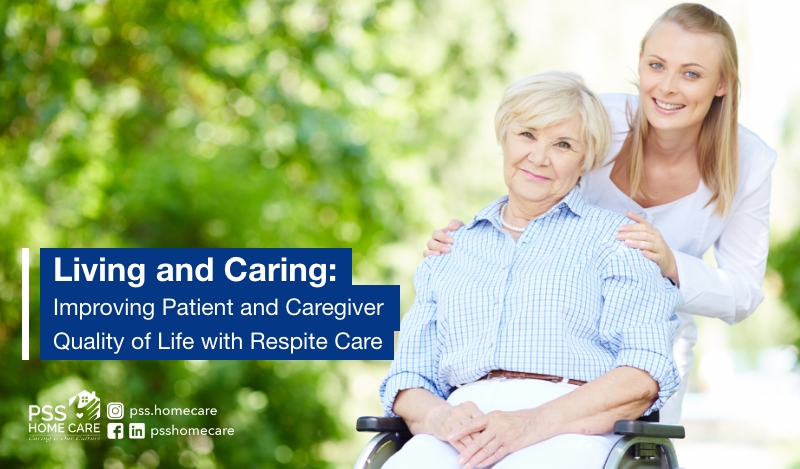A Woman’s Guide to Life After Menopause Menopause, which occurs...
Read More
- Ruark Tapel
- April 20, 2022
- No Comments
Living and Caring:
Improving Patient and Caregiver Quality of Life with Respite care

Our population is undeniably aging. According to an Urban Institute study, the number of Americans ages 65 and older will reach 80 million by 2040 — this means that 1 in 5 people will be 65 years and older and that older adults who are 85 years and older will nearly quadruple between 2000 and 2040.
And as the nation ages, there is a great need for caregivers. And the majority of primary caregivers are family members, who are oftentimes juggling full-time work with caregiving tasks. One of the 40.4 million caregivers in the US — 9 out of 10 of which are family members providing care to older loved ones — is Karla, who is caring for her 83-year-old mother.
“Being the primary caregiver for my mom is what I personally wanted to do, especially since my dad passed away in 2018. We’ve always been a tight-knit family and I’m more than happy to be able to care for my mom in this capacity,” Karla remarked.
Karla describes herself as someone who simply wants to be on top of things. She enjoys caring for her mother while working for an advertising company and caring for her teenage daughter. However, she admits that it is a huge responsibility.
“I’m very fortunate because I’m able to work from home; it’s easier for me to be there for my mom when she needs me. But I must admit that it can be very stressful at times. Sometimes, you’d crave for a bit of me-time but you just have too much to do. And when I’m stressed, exhausted, or even sick, I know I’m not going to be able to give the care that my mom needs and quite frankly deserves,” she shared.
For individuals like Karla who prefer to keep their older loved ones at home and care for them but need some time for themselves to rest, relax, or tend to other tasks, respite care can help. Respite care provides a short-term break for primary caregivers by assigning or transferring caregiving tasks to another caregiver. Respite care can be done in a person’s home or at a respite care facility.
The benefits of respite care for primary caregivers and patients
Caregivers can get a much-deserved break and peace of mind.
Caregiver burnout, which is the mental, emotional, and physical fatigue, can happen when primary caregivers overextend themselves. With respite care services, primary caregivers can have several hours a day of rest, allowing them to also care for themselves.
With a professional caregiver“When we started getting respite care for my mom, I was able to go back to a few hobbies I really enjoyed and helped me relax. I had time to journal and crochet again. I really started feeling better, which in turn, made me become more cheerful when I’m with my mom,” said Karla.
Primary caregivers can also leave the house for errands, exercise, or even a vacation and have peace of mind that their loved ones are being cared for properly.Patients can get flexible and professional care.
Having a professional caregiver come to provide home care services to older individuals have many benefits. They are experienced in caring for patients with challenging conditions such as Alzheimer’s or parkinson’s disease.With respite care services, patients can have caregivers who will take care of them for a matter of hours or even round-the-clock, depending on the patients’ needs. Patients can also get care right at at home, allowing them to do their daily routines at a comfortable and familiar location.
Both patients and caregivers can have more social interaction and try new activities.
With respite care services, patients can meet new caring individuals with whom they can build new social and emotional connections, while primary caregivers can reconnect with friends and colleagues. Home health aides can also influence patients to try new activities that would benefit their physical, mental, and psychological health.
Depending on a patient’s health, a home health aide can help him or her explore new activities such as playing new games, going to different parks or museums, or listening to music. “It’s amazing just how my mom and Marge, her home health aide, clicked. Marge is a godsend — through her friendship and expert caring, my mom discovered new things about herself that she didn’t know. She’s taken a liking for plums and card games. She’s blossoming into a more happy individual, and it’s been wonderful,” Karla stated.
Caring is our Culture
At PSS Home Care, we provide top-notch respite care and home care to older adults, as well as people living with disabilities, chronic illnesses, or cognitive impairments. Our home health aides help our clients with activities of daily living such as bathing, dressing, and grooming, among many others. They also prepare healthy meals and oversee the administration of prescribed medication. These and more are what make PSS Home Care’s brand of compassionate care exceptional.
For more information about our home care services, contact us at 718-752-9833. We’d be glad to discuss possible care options that best suit your loved ones’ needs today.
Check out our other articles
Monkeypox Overview: What It Is, Who’s At Risk, and What You Need to Know
Monkeypox Overview:What It Is, Who’s At Risk, and What You...
Read MoreLiving and Caring: Improving Patient and Caregiver Quality of Life with Respite Care
Living and Caring: Improving Patient and Caregiver Quality of Life...
Read MoreHappy Lives with HHAs: How to Help the Elderly with Loneliness
Happy Lives with HHAs: How to Help the Elderly with...
Read More



